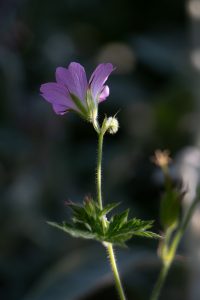Ord Om ordet
18 Sunday C
Ecclesiastes 1.2-23: Vanity of vanities!
Colossians 3.1-11: When Christ your life appears you will appear with him in glory.
Luke 12.13-21: This night your life will be demanded of you.
In a curious and fascinating text, the German philosopher Ferdinand Ulrich wrote about an insight that came to him in prayer in the early 1990s, when he was about sixty years old. It enabled him to re-experience the circumstances of his birth: the trauma of leaving the womb, the fight for life. It let him touch an overwhelming perception born at that instant, which his mature mind formulated retrospectively as follows: ‘I am alive! I entered deep into myself as into the foundation of my existence; like one who guards a treasure I bent over my life and held it fast.’
He thought of himself as thinking: ‘No one will take this away from me. This is my life; no one will get to it.’ An anxious intuition whispered in his ear that this dear possession could be taken from him, that he would have to surrender it; but he turned away from that fear. As an old man looking back, he reflected: ‘That was my first sin. For years I would revisit in prayer the moment in which I tore my life to myself, […] hunching over it like a robber over stolen treasure.’ He contrasted this infant impulse with what we read of Christ in St Paul’s letter to the Philippians: ‘being in the form of God, [he] thought it not robbery to be equal with God’. Ulrich mused: ‘[Life hoarded] as robbery, yes: that was my sin.’
A biologist hearing this account would think, no doubt: ‘What a lot of rubbish!’ In so far as there is substance to Ulrich’s recollection, it simply reflects a quest for survival that is common to all organic life. Where would we be without it? Think of a chick determinedly making its way out of its shell. Our entry into daylight was not all that unlike it. At such a time there is no room for resignation. Every atom of the newborn’s being calls out in chorus a single refrain: I want to live!
Yet our experience differs from that of other species. A man, a woman just isn’t a battery hen. Endowed with consciousness, we reflect on life. We realise how fragile it is, ‘like changing grass’. The predicaments to which we are subject are legion. What springs up full of promise at dawn, wilts by dusk. It is tempting to moan with Qohelet, ‘Vanity of vanities’. All the more shall we be jealous of the hoard uniquely ours: our existence. We cling to life, thinking: ‘I’ll not let it go.’
Why did Ulrich classify this impulse as sin? Because revelation had taught him what biology cannot: a view of the human condition which does not reduce it to a battle for survival; which sees its finality, rather, in a call from without that invites us to lay down our lives. Note the crux of Jesus’s parable of the rich man set on building bigger barns. The story is cartoonish, showing us how ridiculous it is to accumulate endless stuff in a precarious world. That lesson is valid, but not particularly Christian; it might as well have been taught by a stoic or an Oriental sage. Its Christian specificity transpires in the words addressed to the rich man by the Lord towards the end, when God says: ‘this night your life will be demanded of you’. If you look up the text in Greek, you will find that the demanding is done by a plural subject: ‘they will be asking [ἀπαιτοῦσιν] your life from you’. Immediately we think of other Scriptural sayings: the parable of the wise and foolish virgins, in which a collective cry resounds at midnight, ‘The bridegroom is coming!’ (Mt 25.6); or the call introducing the culmination of the Apocalypse, ‘The Spirit and the bride say, “Come!” Let the one who hears say, “Come!”’ (Ap 22.17).
We are put into this world to thrive. It is right that we should love life, wish to make the most of it; it is precious. We know this by instinct. What we must learn by faith is this: the reality we call ‘life’, or ‘self’, is not self-sufficient; it will only know true flourishing in ecstasy, that is, in going beyond itself in free self-giving to another.
Genesis explains this aspect of our being by telling us we are made in the image of God, for fellowship with him, called, here and now, to foreshadow that communion in human love and friendship. Quite simply: ‘it is not good for man to be alone’ (2.18).
The Gospel refines our self-understanding by unfolding the wonderful mystery of Christ, the ‘Yes’ of God (2 Cor 1.20), who not only did not think it ‘robbery to be equal with God’, but ‘desired with desire’ (Lk 22.15) to pour himself out for the world’s redemption. Christ is more than an exemplar we are asked to imitate. He is, as St Paul teaches us, our life; to be a Christian is to subsist in him, to consecrate all our energies to him with vitality now, then with trustful serenity at the hour of our death.
Our task on earth is to learn to receive life in fullness, with both hands; then to refrain from clutching what is given; keeping instead our hands wide open, raising them up in joyful oblation at morning, noon, and night. If we consent to living thus peace will be given us, and freedom. We’ll no longer need to hoard life as loot. For fear will be no more.

Photograph: Margot Krebs Neale.
